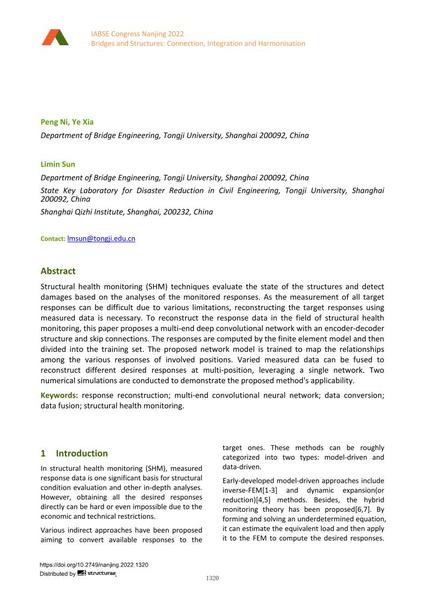Response Reconstruction Based on a Multi-End Convolutional Neural Network

|
|
|||||||||||
Bibliografische Angaben
| Autor(en): |
Peng Ni
(Department of Bridge Engineering, Tongji University, Shanghai 200092, China)
Ye Xia (Department of Bridge Engineering, Tongji University, Shanghai 200092, China) Limin Sun |
||||
|---|---|---|---|---|---|
| Medium: | Tagungsbeitrag | ||||
| Sprache(n): | Englisch | ||||
| Tagung: | IABSE Congress: Bridges and Structures: Connection, Integration and Harmonisation, Nanjing, People's Republic of China, 21-23 September 2022 | ||||
| Veröffentlicht in: | IABSE Congress Nanjing 2022 | ||||
|
|||||
| Seite(n): | 1320-1328 | ||||
| Anzahl der Seiten (im PDF): | 9 | ||||
| DOI: | 10.2749/nanjing.2022.1320 | ||||
| Abstrakt: |
Structural health monitoring (SHM) techniques evaluate the state of the structures and detect damages based on the analyses of the monitored responses. As the measurement of all target responses can be difficult due to various limitations, reconstructing the target responses using measured data is necessary. To reconstruct the response data in the field of structural health monitoring, this paper proposes a multi-end deep convolutional network with an encoder-decoder structure and skip connections. The responses are computed by the finite element model and then divided into the training set. The proposed network model is trained to map the relationships among the various responses of involved positions. Varied measured data can be fused to reconstruct different desired responses at multi-position, leveraging a single network. Two numerical simulations are conducted to demonstrate the proposed method's applicability. |
||||
| Copyright: | © 2022 International Association for Bridge and Structural Engineering (IABSE) | ||||
| Lizenz: | Die Urheberrechte (Copyright) für dieses Werk sind rechtlich geschützt. Es darf nicht ohne die Zustimmung des Autors/der Autorin oder Rechteinhabers/-in weiter benutzt werden. |
||||
